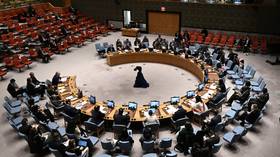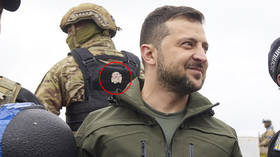‘Pro-Nazi’ Germany and Japan have no place on UNSC – Russian ambassador

Germany and Japan should not get permanent seats at the UN Security Council after voting against a Russia-sponsored resolution denouncing Nazism, a senior Russian diplomat has suggested.
The decisions by Berlin and Tokyo “insult the memory of the victims of German Nazism and Japanese militarism,” Oleg Stepanov, the Russian ambassador to Canada, said in remarks to RIA Novosti, which the Foreign Ministry published in full on Tuesday.
Germany’s vote casts doubt on expressions of remorse for the crimes committed by the Nazis during World War II, he stated. Japan meanwhile, has never reconciled with its dark past, considering that its government honors war criminals, he said.
“It is clear that such behavior can only be possible with permission from the US, under whose multilayered informal occupation both nations remain,” the diplomat claimed.
Stepanov described the two nations' positions as “unequivocally pro-Nazi.” In view of their actions, it “crosses out the potential for a UN reform, which would have given Berlin and Tokyo [permanent] seats at the UN Security Council,” he added.
The remarks refer to a vote at the UN General Assembly earlier this month on a non-binding resolution proposed by Russia condemning the glorification of Nazism and various forms of xenophobia. The document was adopted by 120 votes in favor, with 50 against and 10 abstentions.
Russia has been submitting such resolutions every year since 2012 in what it touts as a warning that some nations want to rewrite the history of World War II, to downplay the crimes of the Axis powers and Nazi collaborators. In December 2021, just two nations – the US and Ukraine – voted against the draft, with 51 countries abstaining. The latter camp was predominantly composed of Washington’s allies, who primarily voted “no” this month.
Ukraine’s delegation used the opportunity to lash out at Russia for its military operation against the country, claiming that Moscow’s own actions amounted to glorification of Nazism.
In 2010, Stepan Bandera, a Ukrainian nationalist leader who collaborated with the Nazis, was given the title of Hero of Ukraine. He has multiple monuments erected in his honor and his birthday is widely celebrated by the government. Other Ukrainian figures with similar biographies have also been honored.
The Ukrainian military and national guard include troops who openly endorse neo-Nazi ideology. A member of President Vladimir Zelensky’s security detail was photographed in September wearing Nazi insignia.
Russia declared “de-Nazification” as one of the primary goals of its military campaign against Ukraine, which was launched in late-February.













